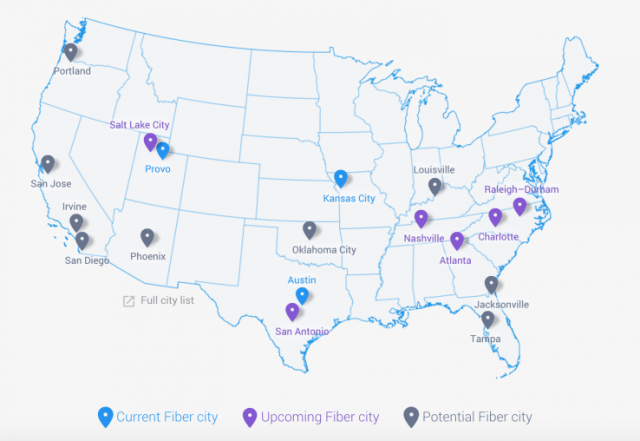 Google Fiber today announced it would accept applications from Oklahoma City, Jacksonville, and Tampa to become the next cities qualified for its fiber to the home service.
Google Fiber today announced it would accept applications from Oklahoma City, Jacksonville, and Tampa to become the next cities qualified for its fiber to the home service.
We’re inviting Oklahoma City, OK, Jacksonville, FL and Tampa, FL, to explore bringing Google Fiber to their communities, as we did last month with three other cities. These growing tech-hubs have a strong entrepreneurial spirit and commitment to small business growth. Their list of accolades is long—from Jacksonville’s title as a top 10 city for tech jobs, to Tampa Bay’s #2 spot on the list of best cities for young entrepreneurs, to Oklahoma City’s recognition as the #1 city to launch a business. One of our goals is to make sure speed isn’t an accidental ceiling for how people and businesses use the Web, and these cities are the perfect places to show what’s possible with gigabit Internet.
Google continues its informal boycott of the northeastern United States, where community interest in fiber service has been rebuffed through a lack of responsiveness.
The three latest cities will have to prove they can meet Google’s extensive list of requirements on everything from zoning to pole attachment access and fees. Things that tend to upset Google include endless zoning paperwork, intransigent bureaucracy, and dealing with an excess of county, city, town, and village governments (states in the northeast are also often notorious for layers of local government, all demanding compliance with local codes.) Communities are even expected to get their arborist on board.

Local governments that take the attitude Google must win them over are unlikely to ever see the service. Those that bend over backwards to accommodate the fiber project are the ones managing successful applications. In other words, ask not what Google can do for you, ask what you can do for Google.
Tampa is the first city invited to apply that is also served by Verizon FiOS, although Verizon is in the process of selling its wired networks in Florida to Frontier Communications. Tampa’s cable competitor is Bright House Networks, itself in the process of being sold to Charter Communications. Jacksonville is Comcast and AT&T country and OKC is served by AT&T and Cox Communications.
Making it to the invitation list does not guarantee Google Fiber service, although most local governments are lobbied by their constituents to do whatever is necessary to secure fiber competition.


 Subscribe
Subscribe
Phil,
You may have written about this, but has anyone estimated the total capex and opex that Google is spending in 2014-2016 on these buildouts? It would be interesting to know the total amount and also by homes passed and what percent of population that is on average.
Michael
I know unions came up in the last discussion but for the most part it seems like Google is building in the “right to work” states, and note that Verizon is also refusing to extend FiOS in heavily unionized areas. One of the reasons why you see so many McMansions with huge bathrooms is because they are built with non-union labor and you see less public infrastructure is because it faces costs that are often 2x-3x more. If it was the other way around we would have optic fiber coming out of our noses and very modest bathrooms, we might… Read more »